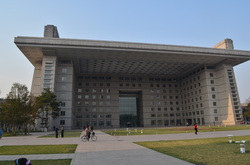
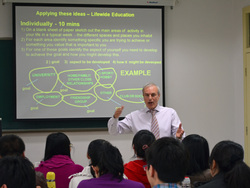
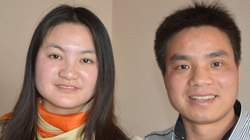
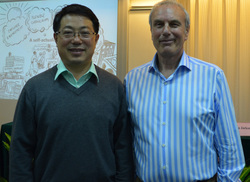
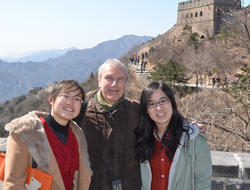
Sometimes you know when you have a made a relationship from which new things will grow and I sense that my relationship with BNU, thanks to Professor Hong and the students I met, will continue to grow.
| norman's website |
|
 Once in a while we have experiences that are so different from our normal day to day routines because we have inhabited a very different sort of cultural space. This was one of those experiences when I visited the Education Faculty of Beijing Normal University - the leading institution of education in China. Thanks to the generosity of Professor Hong and the university my wife and daughter were able to come with me.  I gave two talks to postgraduate students at the Faculty's International Workshop on Large Scale Assessment and Institutional Evaluation. It gave me the chance to talk to students about lifewide learning and education and to gain their perspectives on what it meant to them in their lives and to its relevance for China. Through my conversations with students and faculty I formed a view that there is a lot of pressure on young people in China to perform well throughout their schooling, college and university and the style of teaching, learning and assessment demands a lot of discipline and compliance. Students have huge respect for their teachers but they are also taught to be dependent rather than independent learners. They seem to have little time for activities outside of the formal curriculum although undergraduate degrees have embraced the US liberal arts education model and include general education as well as their major subject.  Nick and Huang I interviewed several students and although they recognised the relevance and importance of lifewide learning in their own lives they doubted whether lifewide education would be possible in Chinese universities. Firstly they thought that parents wanted their children to concentrate on getting good grades and notheing else mattered. Secondly they felt that faculty would resist and not want to put the effort in to change. They felt that pressure would have to come from employers saying that they wanted employees with the sorts of capabilities that require development through lifewide experiences.  Our host Professor Hong Chegwen Turning to my own lifewide learning this week was very special. We were shown the meaning of hospitality. Our host Professor Hong Chegwen was so friendly, kind and generous with his words and his time. We dined with him almost every night. He is a most entertaining and funny host and we were introduced to the most amazing dishes. I can't remember experiencing so many different dishes in such a short space of time and the Chinese dining culture of continuously toasting each other and the wisdom gained through life. It is a very nice custom and toasting life and the people in our lives seems to fit very well with lifewide learning.  Li Xiaoyan and Zheng Lingyu Throughout the week our wellbeing was cared for by two students - Li Xianoyan and Zheng Lingyu. We will never forget their friendliness and kindness and their generous gifts of their time and help in enabling us to see some of the many attractions of Beijing including the Forbidden City, Great Wall, Tian an Men Square and some of the Ho Hoi hutongs and markets. They guided and advised us with great care and attention always smiling and never tiring of answering our questions so that we could grow better meanings from our experiences. They acted as cultural interpreters and I could see how such people are essential to lifewide learning when you move into such unfamiliar cultural contexts. We are indebted to them for their help and we hope to be able to repay them in the future when they come to England. Sometimes you know when you have a made a relationship from which new things will grow and I sense that my relationship with BNU, thanks to Professor Hong and the students I met, will continue to grow.
0 Comments
Travel certainly broadens the mind by opening your eyes to worlds that are very different to your own. I am in Riyadh attending the International Forum of Innovative University Teachers being held at the Imam Muhammad Ibn Saud Islamic University. I lived in Saudi Arabia over 30 years ago and I was keen to see how it might have changed. I realised very quickly that some things never change as I sat clutching the seat (no seat belts), as my taxi driver remonstrated with an overtaking car at 50mph..on the drive from the airport!!!! The second thing that hadn't changed was the generosity and hospitality of my Saudi hosts who looked after me very well. The photo shows some of the many people, including students, who helped make the conference a success. I had been invited to give a talk on my study of change in a university (see below). I was worried that what I had to say about change and innovation in an English university would not translate into what seemed to me to be a very different culture of higher education. But when I asked this question I was told by the Dean of Development and a number of university teachers that they recognised the factors and conditions that were relevant to change and innovation in their universities. I was greatly relieved and also pleased that what I had discovered were some universal principles that might be applied to universities in any higher education system so that was important learning for me. I learnt that Saudi Arabia is growing its university system very quickly (someone said 26% of GDP was going into higher education). What was clear was that university teachers are grappling with the same issues in developing more engaging and relevant forms of learning as university teachers in the UK and elsewhere. The same sorts of topics were being covered - e-learning, e-portfolios and social networking, project based learning and problem based learning and many other progressive forms of learning activity. Amongst the many excellent contributions was a presentation given by a medical educator Dr Ammar Attar Umm al-Qura , who is pioneering a lifewide approach in the medical curriculum. (Students undertake a project of their choice that must relate to their personal interests and passions and then put on an exhibition for the benefit of staff and students. Students were motivated to produce books, films, poems and many different artefacts and through their creativity they connected their products to the medical disciplinary field. A great example of LWE in action. Dr Attar kindly agreed to join our community and represent LWE in the Kingdom. The one thing that felt very strange was the fact that men and women sat in different conference theatres that were linked through sound and projection.. Interestingly, the women could see us but we could not see them. It was my first experience of this form of segregation and it felt very strange though of course I respect that this is deeply cultural. I take home with me many happy memories and several new friendships that I hope will be continued. My presentation 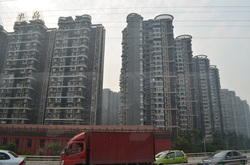 There is nothing quite like experiencing a new place for bringing home to you the importance of place and space in determining who you are and I have always thought that travel, especially if it involves going somewhere you have never been before, can fundamentally change your understanding about the world I have just spent 5 days in Chengdu, a large city in the west of China, to attend a conference on creativity in higher education. I was met at the airport by two very likeable student volunteers who are studying English and translation studies at Sichuan University. By volunteering to meet and greet they felt they were enhancing their education. The plane was delayed so it was quite late when we arrived but I was greatly relieved to see them and they whisked me the hotel in the centre of the city and then helped me check in - which was great because I my room booking hadn't worked and the receptionist did not speak English. It required quite a lot of negotiation. The city at night looked like any other city but I took a walk in the early morning rush hour and it is quite different to anywhere else I have been. We are on a busy main road, 3 lanes in each direction and tall grey concrete buildings on either side. At 8am it was really bustling with traffic in all directions including bikes and motorbikes/scooters on the pavement. The sounds were like any city but the smells were different to anything I had experienced before, except perhaps for Chinatown in London. The people looked similar as they walked briskly to work or university, which is just next door to the hotel. One interesting thing I noticed was that the footbridges over the busy road did not have steps that had stepped ramps and then I realised these were to enable scooters to ride over them. When I got back I went to breakfast determined to try the Chinese cuisine. In fact, there was only Chinese cuisine. A long table with perhaps 30 dishes on it and many vegetables I had never seen before (there were no labels). I had a good go at trying about 15 of them I recon.. Only small amounts but enough to discover which I likes and which I didn't. Many of the tastes were familiar from the Chinese food I'd eaten before but a lot were alien to my taste buds - quite a lot were very bland or subtle depending on your point of view. What was also strange to me was sitting at large round tables with people who I didn't know. In English hotels we have small tables and you keep to your own space. It does us good from time to time to experience a new place which is culturally very different from our own in order to remind us what it feels like to experience that sense of foreignness and inadequacy (because of an absence of language and cultural understanding), unfamiliarity and uncertainty because the context is so very different to what we know. 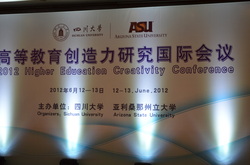 The conference itself was focused on how to bring about change in higher education so that it is more able to develop students' creative potential..with a strong focus on the reform of Chinese universities so that can prepare students so that they are more innovative. I was an invited speaker and I was treated with great respect. My presentation, on the afternoon of the first day on developing personal creativity through lifewide education seemed to be well received although the ideas were alien to many of the participants. When I reflect on the conference I don't think I learnt very much about creativity - there was too much replication of existing ideas and not enough new ideas (for me). But I realise I wasn't there for me. I was there to play my part in sharing some of my ideas. And what really struck me was the enormous thirst for knowledge and new ideas that might form the basis for new strategies to help China move forward in the direction it has set itself. I was delighted and honoured to be told that my book Developing creativity in higher education was being translated by students of the university as one of 10 books on creativity that have been selected to provide a starting point for creative scholarship and practice. 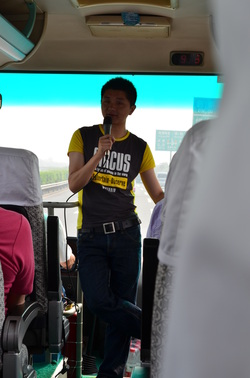 So what did I learn? By being in Chengdu, by listening to the Sichuan University institutional leaders, talking to participants especially the students who did all the behind the scenes organisation and looked after participants individual needs, I felt I learnt a lot about Chinese higher education and what it was trying to accomplish. From the students I learnt what it was like to be a student and for a young person to live in China today. In other words my most important learning was contextual and relational. I also learnt a lot about what is valued in Chinese culture. Throughout the conference the meals had been one of the highlights - Sichuan food is some of the most delicious food I have ever taken and it is a very social affair. We were also treated to some wonderful restaurants - some of which were in buildings constructed in a traditional way. Chengdu is full of wonderfully recreated old buildings that enable you to appreciate the past. But the last day in Chengdu was very special. The university had provided us with a conducted tour of the city with an emphasis on giving us a flavour of their cultural heritage. The tour guide 'Bobby' was a brilliant and knowledgeable communicator -perhaps the most creative person I had met all week. Written on his T-short were the words There are two sorts of people in the world - those that entertain and those that observe.. he was most definitely in the first category.  We set off at 8.30am and he talked us through the day on the way to our first stop the Panda sanctuary about an hour out of the city where I expanded my knowledge of Panda's a thousand fold..and got some great photos.. 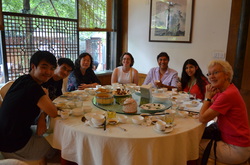 Then it was back into the city for a wonderful traditional Sichuan lunch shared with the other participants on our day trip. - the wonderful multidish Sichuan 'snack' 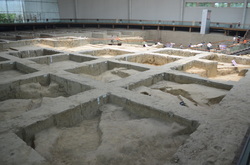 After lunch we went to the most amazing museum built on the site of a 3000 year old town - the Jinsha site museum. The architecture and the methods used to display the site will remain with me for ever... It was impossible not to be humbled by the creativity and craftsmanship and use of technology by these ancient people and at the same time be overwhelmed by the creativity in the architects' designs (apparently a graduate student who won an open competition, and the way artefacts had been displayed. I could not help but compare these concrete manifestations of creativity with our thinking and talking about it in an abstract way. 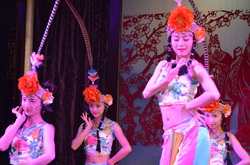 After another splendid meal in the evening we went to the Sichuan opera and were treated to another cultural feast - including opera, shadow shapes, Erhu music, drama, and costume/face changing.. all local traditions and very interesting.. Again I was struck by the enormous creative talent on display. The audio file records some of the Chinese opera. Postscript: At the end of my talk one of the participants asked me a question which I did not fully understand.. he was making a comment about the contribution of personal creativity to culture equating to the production of low culture... It was only after experiencing the things that I have described that I now understand what he was saying. I think he was saying that personal creativity unless it is dedicated to contributing to a form of art or craft that is accepted as an important form of cultural reproduction will only ever produce/re-reproduce low cultural forms - popular culture.
For most of this week, my daily physical exercise comprised an hour a day in the three acre woods picking up branches that had blown down in the storms over winter and maintaining the pathway that goes round the edge of the wood.. At this time of the year with the sunlight streaming through the trees, the bulbs and seedlings bursting through, and the fantastic birdsong, it's as much an emotional experience as it is physical. Like many English people, spring is my favourite season, it always has been and it was also Jill's favourite season and for Taraneh it is the start of the Iranian New Year or 'Nor Rooz' - its 1392 this year. The ancient, Zoroastrian New Year begins on March 21st - the spring equinox. Tradition says it dates back 15,000 years to before that last ice age when we transitioned from hunter gatherers to farmers. Nor Rooz begins with spring cleaning and the laying of the Hafseen - ancient symbolic representations. Here is our table.. There is a tradition of buying new clothes and of exchanging gifts like we do at Christmas and the traditional meal on the first day of the festival is fish and rice which we shall have tonight. New Year itself is celebrated over 12 days in which people visit family, friends and neighbours. The end of the festival - the 13th day is marked by a picnic. I can't help but think that this is a much better way of starting a new year than beginning it in the depths of winter. I also like the symbolism created and passed on over the millennia which connects the present to the past. This Youtube video provides a good explanation of the festival and its traditions. |
PurposeTo develop my understandings of how I learn and develop through all parts of my life by recording and reflecting on my own life as it happens. I have a rough plan but most of what I do emerges from the circumstances of my life
Archive
January 2021
Categories
|
|
|